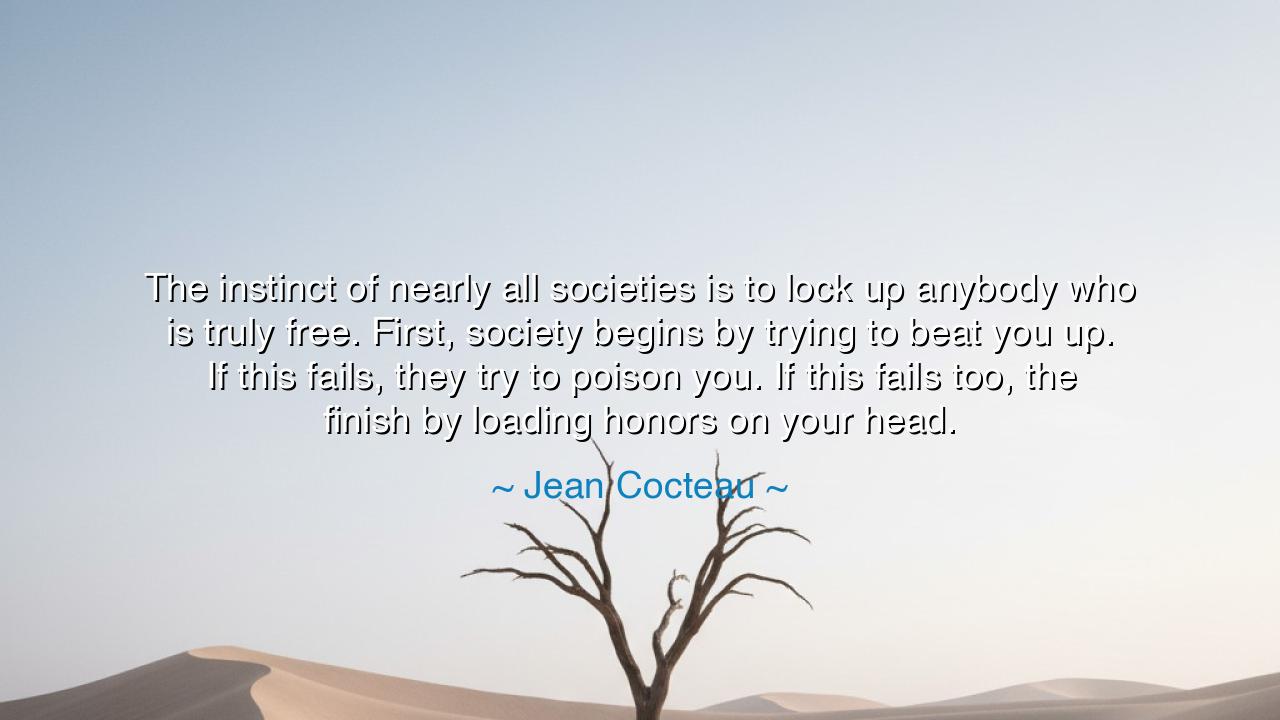
The instinct of nearly all societies is to lock up anybody who is
The instinct of nearly all societies is to lock up anybody who is truly free. First, society begins by trying to beat you up. If this fails, they try to poison you. If this fails too, the finish by loading honors on your head.






"The instinct of nearly all societies is to lock up anybody who is truly free. First, society begins by trying to beat you up. If this fails, they try to poison you. If this fails too, they finish by loading honors on your head." These provocative words from Jean Cocteau reveal a painful, yet timeless, truth about the tension between the individual and the society in which they live. The truly free person—one who is not bound by the norms, the laws, or the expectations of their society—becomes a threat. A threat not only to the status quo but to the power structures that govern the collective. Cocteau’s quote suggests that society, rather than embracing true freedom, will first attack and attempt to suppress the individual. If this fails, it will attempt to poison or undermine their influence. But, as a final recourse, society often resorts to elevating the individual to a position of honor, not because it seeks to embrace their freedom, but because in doing so, it absorbs their power, turning them into something more palatable, less threatening to the collective order.
In the ancient world, this paradox of the free individual was already evident. Socrates, perhaps the most famous example, found himself caught in the tensions between his own freedom of thought and the demands of the Athenian state. He did not conform to the conventional wisdom of his time, questioning the very nature of virtue and truth. Instead of embracing his ideals, society sought to punish him, condemning him to death. In the end, the Athenians did not simply annihilate Socrates' influence; they elevated his position, turning his trial and execution into a symbol of the dangers of state control over the individual. His death was a tragic honor, one that ultimately immortalized his ideas and made him a martyr for freedom of thought. This, in essence, was Socrates' final transformation—from a challenging figure of rebellion to a heroic symbol, co-opted by a society that had once sought to destroy him.
In Rome, the story of Julius Caesar provides another example. As Caesar rose in power, his sheer genius and ability to transcend the norms of Roman politics made him an undeniable force. Initially, the Senate sought to undermine him, using political maneuvering to thwart his ambitions. They attempted to discredit him, to poison his reputation and weaken his standing. Yet, when Caesar continued to rise, the Senate resorted to the ultimate act of elevation: they declared him dictator for life. Ironically, this honor—meant to be a crowning achievement of his power—was also a symbol of his trapped position. He became a prisoner of his own fame, no longer a free man, but a figurehead in a system that sought to control him. The Senate, in the end, did not destroy Caesar—they made him a symbol, a spectacle of Roman authority, ensuring that his power was not disruptive but ultimately part of the larger machinery.
Cocteau’s quote is also a reflection of the modern world. Think of the artists or revolutionaries of the 20th century—figures like Pablo Picasso, Frida Kahlo, and Che Guevara—who were once seen as threats to established norms. Picasso’s artistic freedom, his disregard for classical forms, was initially met with scorn. Yet over time, society did not destroy his influence; it embraced him, turning him into an icon of modern art. Similarly, Frida Kahlo, whose deeply personal and radical works broke new ground in both art and feminist thought, became a symbol of strength and independence, though her original defiance of cultural norms was often misunderstood and even mocked. In both cases, the artists’ freedom was eventually co-opted, transformed into something that society could manage, as their ideas were turned into commodities or symbols of rebellion that society could comfortably celebrate.
The lesson here is that true freedom is often seen as a threat by the powers that be—whether in the ancient world, the modern world, or in our own time. Society, especially in its most conservative forms, instinctively resists those who challenge the status quo. It begins by attempting to discredit or suppress them. If that fails, it seeks to poison their influence, to turn their power against them by corrupting their message. Finally, when all else fails, society honors them, not because it seeks to embrace their freedom, but because it knows that in doing so, the individual is safely contained, their radical spirit neutralized and made palatable to the masses.
This teaches us a profound truth: freedom is not something easily granted or comfortably accepted. It is often contested, misunderstood, and rejected by those in power. But, in time, true freedom often rises, and when it does, it changes the very nature of society. However, to truly embody freedom, to remain uncompromised and authentic, we must resist the temptation to conform, to be co-opted by honor or fame, and instead remain steadfast in our pursuit of truth and individuality. Freedom is not something to be elevated and consumed by the masses; it is something to be lived, unapologetically, in the face of adversity. Let us embrace our freedom, not as a tool of approval but as a living, breathing force that shapes the world around us.






AAdministratorAdministrator
Welcome, honored guests. Please leave a comment, we will respond soon